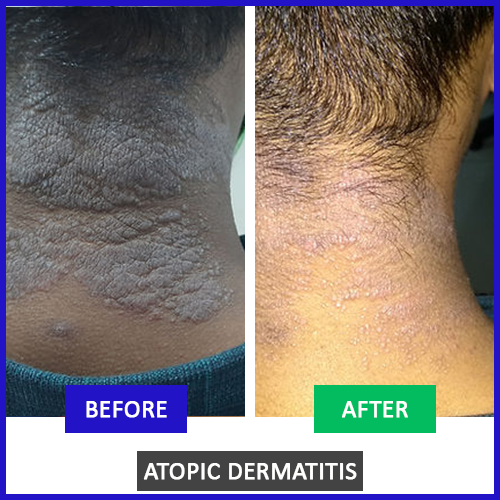Atopic dermatitis

1. What is Atopic Dermatitis (Eczema)?
Atopic dermatitis is a chronic inflammatory skin condition characterized by dry, itchy, and inflamed skin. It often starts in childhood but may persist or even begin in adulthood. Eczema is often linked to genetics, immune dysfunction, and environmental triggers.
2. Signs and Symptoms of Atopic Dermatitis
- Persistent Itching: Often worse at night
- Dry, Scaly Skin: Especially on the face, elbows, knees, neck, or hands
- Red or Inflamed Patches
- Thickened or Cracked Skin (with long-term scratching)
- Fluid-filled Blisters or crusted sores in severe cases
- Recurring Flare-ups triggered by weather, stress, or allergens
3. Causes and Triggers of Eczema
- Genetic Predisposition
- Weakened Skin Barrier: Leads to moisture loss and increased sensitivity
- Immune System Imbalance: Overreacts to harmless substances
- Environmental Factors: Dust, pollen, pet dander, soaps
- Dietary Allergens: Dairy, gluten, nuts in some individuals
- Emotional Stress
- Climate Extremes: Cold, dry air or excessive sweating
4. Common Types of Atopic Dermatitis We Treat
- Infantile Eczema: Appears in babies, often on cheeks and scalp
- Childhood & Adolescent Eczema: Elbows, knees, neck, hands
- Adult Eczema: Persistent or new-onset skin irritation in adults
- Hand Eczema: Due to frequent washing or chemical exposure
- Lichenified Eczema: Thickened skin from repeated scratching
5. Differential Diagnosis
It’s vital to differentiate eczema from other conditions like psoriasis, fungal infections, seborrheic dermatitis, or contact dermatitis. At CureYou, we provide an accurate diagnosis for targeted and effective treatment.
6. Can Eczema Be Prevented or Managed?
While not always preventable, flare-ups can be significantly reduced through:
- Regular moisturizing and gentle skin care
- Avoiding triggers (soaps, allergens, hot water)
- Wearing soft, breathable clothing
- Managing stress and anxiety
- Using mild, fragrance-free products
7. Dietary Recommendations for Atopic Dermatitis
A clean, anti-inflammatory diet supports skin healing:
- Avoid: Processed foods, artificial additives, excessive dairy or gluten (if sensitive)
- Include: Omega-3s (flaxseeds, walnuts), Vitamin E (almonds), Vitamin C (citrus), Zinc (seeds, legumes), and probiotics (curd, kefir)
- Stay Hydrated: Drink enough water to maintain skin moisture
8. Homeopathic Treatment for Atopic Dermatitis at CureYou
Homeopathy treats eczema by correcting the internal imbalance—not just soothing the surface. At CureYou, we offer personalized remedies that:
- Reduce inflammation and itching naturally
- Improve skin hydration and resilience
- Calm immune overreactions to allergens
- Address emotional triggers like stress or anxiety
- Prevent recurrence and minimize long-term skin damage
Our approach is safe for all ages, including babies, and free from steroids or chemical side effects.
9. Success Stories
From infants with red, itchy cheeks to adults with chronic hand eczema, our patients have experienced remarkable improvements through homeopathy. With fewer flare-ups and clearer skin, they now live with more comfort and confidence—naturally.
Any questions? We're here to help
Can homeopathy permanently cure atopic dermatitis (eczema)?
Homeopathy offers long-term relief from atopic dermatitis by targeting the root causes—immune imbalance, skin sensitivity, and emotional stress. At CureYou, we personalize each treatment to reduce itching, heal the skin, and prevent recurrence. Many patients, especially children, have experienced lasting results without relying on steroids or harsh creams.

